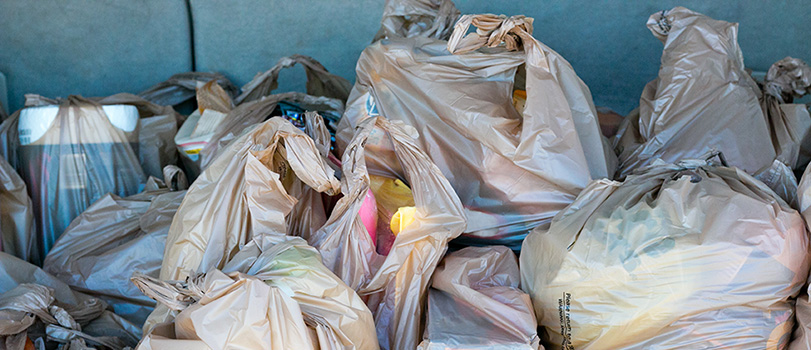More States Ban Single-Use Plastic Bags

Over the last several months, legislatures in Vermont, Maine, Oregon, Delaware, Connecticut, and New York passed bills that include bans on single-use plastic bags. Prior to the 2018/19 legislative session, only California had enacted a statewide single-use plastic bags ban; although, single-use plastic bags are banned in all counties in Hawaii.
California’s single-use carryout bag ban became effective in November 2016. Under this law, most grocery stores, retail stores with a pharmacy, convenience stores, food marts, and liquor stores in the state may not provide single-use plastic carryout bags to their customers. However, retail establishments may provide customers with a certified reusable grocery bag or recycled paper bag at the point of sale for a charge of at least 10 cents.
New York’s plastic bag ban is scheduled to take effect on March 1, 2020. The law bans most single-use plastic carry-out bags provided by grocery and other stores unless they are exempted. Exemptions include bags used to wrap uncooked meat, fish, or poultry; bags to hold food prepared to order; bags used by a customer for bulk items (e.g., fruits and vegetables); bags for carryout or delivered food, and food storage bags. The legislation also allows individual counties to charge five cents for paper bags. Governor Andrew Cuomo signed the legislation banning plastic bags on April 22, 2019. The ban was included in New York’s FY 2020 budget.
Vermont’s Act No. 69 (S.113) prohibits stores and food establishments from providing single-use plastic bags, effective July 1, 2020. Pharmacy bags for prescription medication; bags used inside a store to package loose items, frozen foods, meat, fish, or flowers; and dry-cleaning bags are exempted. The legislation also prohibits food service establishments from providing single-use plastic straws unless requested and bans the sale of expanded polystyrene food service products. The legislation was signed by Vermont Governor Phil Scott on June 17, 2019.
Maine’s H.P. 1115 (LD 1352) bans retail establishments from providing customers with most single-use plastic bags, effective January 1, 2020. The legislation lists a number of exemptions, such as bags for prescription medication, bags for use within a store to package loose items, and dry-cleaning bags. Retail establishments may provide a recycled paper bag of reusable plastic bag for a fee of at least five cents per bag. Governor Janet Mills signed LD 1352 on June 17, 2019.
Oregon’s HB 2509 bans retail establishments and restaurants from providing customers single-use checkout bags. Certain bags are exempted, such as bags for produce, meat, fish and dry cleaning. Stores may provide paper checkout bags, reusable fabric checkout bags, or reusable plastic checkout bags for at least five cents each. The ban becomes effective in January 2020. Oregon Governor Kate Brown signed HB 2509 into law on June 20, 2019.
Delaware’s HB 130 bans bags that are “made from non-compostable plastic and not specifically designed and manufactured to be reusable” effective January 1, 2021. Exceptions include plastic bags to wrap damp items like frozen foods, bags to transport chemicals, and dry-cleaning bags. Governor John Carney plans to sign the bill this month, most likely on July 18, according to his office.
Connecticut's biennium budget for 2019-21 (H.B. 7424) imposes a 10-cent tax on single-use plastic bags that are less than four mils thick between August 1, 2019 and June 30, 2021 and bans them after July 1, 2021 (see Sec. 355). Plastic bags used for to hold meat, seafood, loose produce, or unwrapped food items; newspaper bags; and laundry or dry-cleaning bags are exempted from both the tax and the ban. The budget, which was signed by Governor Ned Lamont on June 26, 2019, allows stores to charge customers a fee for single-use paper bags. Furthermore, municipalities with existing bag bans may keep them in place.